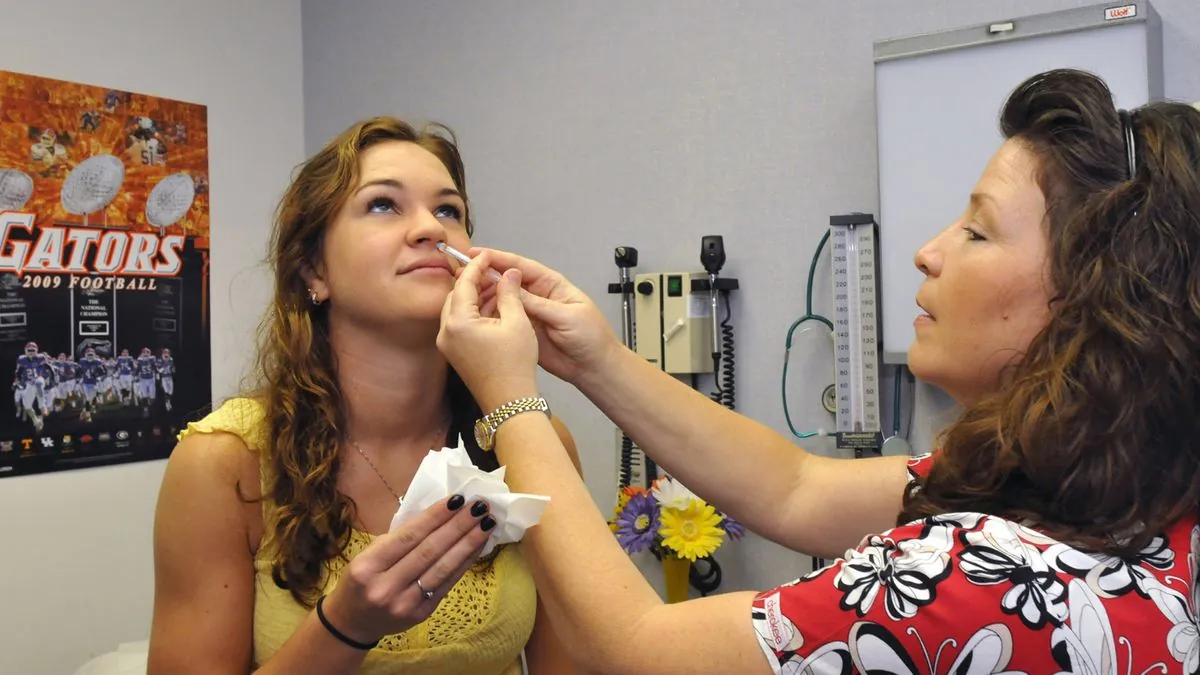FDA Approves First At-Home Flu Vaccine: A Game-Changer for Vaccination
The FDA has approved FluMist for at-home use, potentially boosting flu vaccination rates. This nasal spray offers a needle-free option, but concerns about proper administration remain.

The U.S. Food and Drug Administration (FDA) has taken a significant step in the fight against influenza by approving the first at-home flu vaccine. This decision, made on September 20, 2024, marks a potential turning point in vaccination accessibility and convenience.
AstraZeneca's FluMist, a nasal spray vaccine, will be available for at-home use with a prescription starting in 2025. This development could lead to increased flu vaccination rates, addressing a critical public health concern. The Centers for Disease Control and Prevention (CDC) recommends annual flu vaccination for everyone 6 months and older, highlighting the importance of widespread immunization.

The process for obtaining FluMist will involve an online screening assessment through a third-party pharmacy. Eligible individuals will then be able to self-administer the vaccine or have a caregiver do so, provided the administrator is at least 18 years old. This new option offers greater flexibility and may be particularly appealing to those with needle phobias.
Dr. Peter Marks, director of the FDA's Center for Biologics Evaluation and Research, emphasized the potential benefits: "Today's approval provides a new option for receiving a safe and effective seasonal influenza vaccine potentially with greater convenience, flexibility and accessibility for individuals and families."
FluMist has a long history, having been initially approved by the FDA in 2003 for individuals aged 5 to 49. In 2007, its use was expanded to include children as young as 2 years old. The vaccine utilizes live attenuated influenza vaccine (LAIV) technology, containing weakened forms of the flu virus that cannot cause illness.
While the convenience of at-home administration is clear, some experts have expressed concerns about proper storage and correct self-administration. Dr. Scott Roberts, an infectious-disease physician at Yale School of Medicine, stated:
"I have anxiety that many won't administer it properly, but at least that's better than not getting vaccinated at all, so overall I'm optimistic this is a step in the right direction for public health."
The effectiveness of FluMist has been comparable to traditional flu shots in most years. However, during the 2009 H1N1 flu pandemic, studies found the nasal spray to be less effective against that particular strain. This led to a temporary recommendation against its use during the 2016-2017 and 2017-2018 flu seasons.
Influenza remains a significant health threat, with the CDC estimating between 4,900 to 51,000 annual flu-related deaths in the United States from 2010 to 2023. The approval of at-home FluMist comes at a time when flu vaccination rates have been lower than during the 2020-2021 season, which saw increased uptake amid the COVID-19 pandemic.
It's important to note that FluMist is not suitable for everyone. Individuals with weakened immune systems, pregnant women, and those with certain medical conditions are not eligible due to potential risks associated with the live attenuated viruses in the vaccine.
The current out-of-pocket cost for FluMist ranges from $35 to $45, though many insured individuals can receive it at no cost. As flu viruses mutate rapidly, necessitating new vaccine formulations each year, the availability of an at-home option could play a crucial role in achieving the estimated 80-90% vaccination rate required for herd immunity against influenza.
This FDA approval represents a significant milestone in vaccine administration, potentially paving the way for increased accessibility and higher vaccination rates in the ongoing battle against seasonal influenza.


































